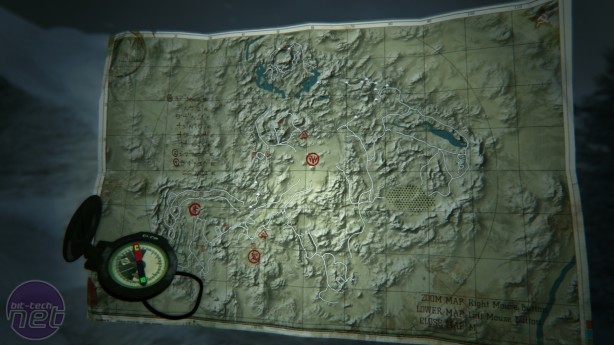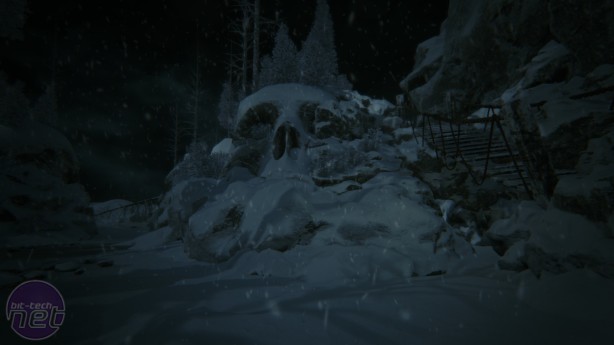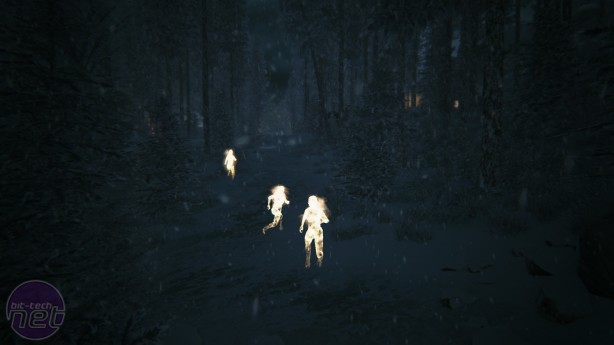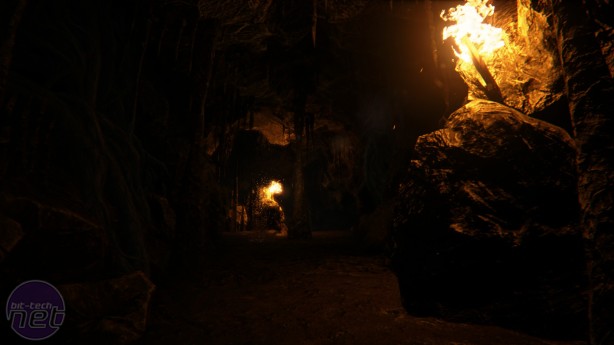
This was hugely disappointing. I'd looked forward to seeing how the developers would tell this story, which version of events they'd settle on. Unfortunately, they've apparently decided to include all of them, resulting in a dizzying assault of seemingly unconnected information. And this is coming from someone who knew about the incident beforehand.
Although the game's approach to storytelling quickly proved underwhelming, I remained intrigued by the world of Kholat . The game's environments are extremely pretty. Its black hills sparkle with trapped sediment and its frozen lakes glisten and crackle underfoot. It also has the best snowstorm I've experienced in a videogame, with snowflakes whirling past your face and whipping through the frosted pine forests.
It's also filled with eerie locations to explore, drawing you toward them using distant lights and unnatural rock formations as landmarks. Kholat places strong emphasis on navigation. There's no marker on the map representing your exact position. Instead, the developers expect you to figure out your own path using a map and compass.
This is a nice idea which, if done right, can be very rewarding. Miasmata is a particularly good example of a game that emphasises navigation. But Kholat completely fails to walk its talk. Although you can choose which direction to head in, the path to every major story location is defined with the rigour of a Victorian schoolhouse. They're also absurdly convoluted, often forcing you to go around, underneath and sometimes even away from your destination before finally bringing you to it.
This is where the frustration truly begins to set in. To ensure you stay on the predetermined path, the developers severely restrict your movement abilities. You can't jump, you can't climb, and you can't step over any obstacle taller than a few inches. Moreover, what appear to be a perfectly reasonable paths are constantly obstructed by rocks and logs that a toddler could mantle. At one point, I briefly stepped off a path moving away from a major location to pick up a note, and discovered that I couldn't go back. Hence I was forced to take a massive detour that involved backtracking along half of the path I'd already traversed.
All of Kholat's level design is like this, arbitrarily mazy and infuriatingly obstructive. I think the idea is to engender some sense of disorientation and fear in the player, thereby encouraging empathy with the victims of Dylatov Pass. Unfortunately, the constant frustration actually lessens the impact of the game's other horror elements. When I'd reach a climactic scene, I'd often feel more relief than terror simply because I'd finally made it to my destination.
To Kholat's credit, there are a few genuinely terrifying moments, but the horror torpedoes itself as much as the environment design does. You aren't alone on the slopes of Kholat. Monsters prowl the darkness; eerie shadows that leave bright orange footprints in the snow. If they spot you, they'll chase you. If they catch you, you're dead.
The structure of these sequences is reminiscent of Alien: Isolation. Except Kholat never explains the rules of its stealth to you. In Alien, you know you can hide under a desk or in a cupboard, that if you make noise the Alien will come and seek you out, and that if it sees you, you're toast. Here, there's no indication of whether you're hidden from view or being too loud or quiet. What's more, whether or not an enemy spots you seems entirely down to chance. Couple this with a save system that only functions when you pick up a note or stumble upon a campsite, and you've got a recipe for mashed keyboard served with shards of monitor glass.
I really wanted to like Kholat, but it alienated me pretty early on. I returned to it several times, finding bits to enjoy here and there. But getting to those points was such a struggle that there's no way I could recommend it. If you want a great horror game, play Outlast. If you want a game about exploration and navigation, try Miasmata. Whatever you do, just ensure avoid a night on Bean Mountain.
Although the game's approach to storytelling quickly proved underwhelming, I remained intrigued by the world of Kholat . The game's environments are extremely pretty. Its black hills sparkle with trapped sediment and its frozen lakes glisten and crackle underfoot. It also has the best snowstorm I've experienced in a videogame, with snowflakes whirling past your face and whipping through the frosted pine forests.
It's also filled with eerie locations to explore, drawing you toward them using distant lights and unnatural rock formations as landmarks. Kholat places strong emphasis on navigation. There's no marker on the map representing your exact position. Instead, the developers expect you to figure out your own path using a map and compass.
This is a nice idea which, if done right, can be very rewarding. Miasmata is a particularly good example of a game that emphasises navigation. But Kholat completely fails to walk its talk. Although you can choose which direction to head in, the path to every major story location is defined with the rigour of a Victorian schoolhouse. They're also absurdly convoluted, often forcing you to go around, underneath and sometimes even away from your destination before finally bringing you to it.
This is where the frustration truly begins to set in. To ensure you stay on the predetermined path, the developers severely restrict your movement abilities. You can't jump, you can't climb, and you can't step over any obstacle taller than a few inches. Moreover, what appear to be a perfectly reasonable paths are constantly obstructed by rocks and logs that a toddler could mantle. At one point, I briefly stepped off a path moving away from a major location to pick up a note, and discovered that I couldn't go back. Hence I was forced to take a massive detour that involved backtracking along half of the path I'd already traversed.
All of Kholat's level design is like this, arbitrarily mazy and infuriatingly obstructive. I think the idea is to engender some sense of disorientation and fear in the player, thereby encouraging empathy with the victims of Dylatov Pass. Unfortunately, the constant frustration actually lessens the impact of the game's other horror elements. When I'd reach a climactic scene, I'd often feel more relief than terror simply because I'd finally made it to my destination.
To Kholat's credit, there are a few genuinely terrifying moments, but the horror torpedoes itself as much as the environment design does. You aren't alone on the slopes of Kholat. Monsters prowl the darkness; eerie shadows that leave bright orange footprints in the snow. If they spot you, they'll chase you. If they catch you, you're dead.
The structure of these sequences is reminiscent of Alien: Isolation. Except Kholat never explains the rules of its stealth to you. In Alien, you know you can hide under a desk or in a cupboard, that if you make noise the Alien will come and seek you out, and that if it sees you, you're toast. Here, there's no indication of whether you're hidden from view or being too loud or quiet. What's more, whether or not an enemy spots you seems entirely down to chance. Couple this with a save system that only functions when you pick up a note or stumble upon a campsite, and you've got a recipe for mashed keyboard served with shards of monitor glass.
I really wanted to like Kholat, but it alienated me pretty early on. I returned to it several times, finding bits to enjoy here and there. But getting to those points was such a struggle that there's no way I could recommend it. If you want a great horror game, play Outlast. If you want a game about exploration and navigation, try Miasmata. Whatever you do, just ensure avoid a night on Bean Mountain.
-
Overall45 / 100


MSI MPG Velox 100R Chassis Review
October 14 2021 | 15:04













Want to comment? Please log in.